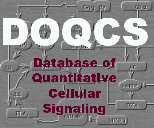
|
Enter a Search String | | Special character and space not allowed in the query term.
Search string should be at least 2 characters long. |
Molecule Parameter List for PLC-Ca | The statistics table lists the distribution of a molecule acting either as a substrate, product, enzyme or as a molecule within the network.
The text color of a molecule is highlighted by  color. color. | | Statistics |
Accession and Pathway Details | |
| Accession Name | Accession No. | Accession Type | Pathway Link | MAPK_network_
2003 | 50 | Network |
Shared_Object_MAPK_network_2003, PKC, PLA2,
PLCbeta, Gq, MAPK,
Ras, EGFR, Sos,
PLC_g, CaMKII, CaM,
PP1, PP2B, PKA,
AC | | This is a network model of many pathways present at the neuronal synapse. The network has properties of temporal tuning as well as steady-state computational properties. In its default form the network is bistable.Bhalla US Biophys J. 2004 Aug;87(2):745-53 |
PLC-Ca acting as a Molecule in MAPK_network_2003 Network
| Name | Accession Name | Pathway Name | Initial Conc.
(uM) | Volume
(fL) | Buffered | | PLC-Ca | MAPK_network_
2003
Accession No. : 50 | PLCbeta
Pathway No. : 209 | 0 | 1000 | No | | |
PLC-Ca acting as an Enzyme in MAPK_network_2003 Network
Enzyme Molecule /
Enzyme Activity | Accession Name | Pathway Name | Km (uM) | kcat (s^-1) | Ratio | Enzyme Type | Reagents | PLC-Ca /
PLC-Ca
| MAPK_network_
2003
Accession No. : 50 | PLCbeta
Pathway No. : 209 | 19.8413 | 10 | 4 | explicit E-S complex | Substrate
PIP2
Product
DAG
IP3
| | From Sternweis et al Phil Trans R Soc Lond 1992, also matched by Homma et al. k1 = 1.5e-5, now 4.2e-6 k2 = 70/sec; now 40/sec k3 = 17.5/sec; now 10/sec Note that the wording in Sternweis et al is ambiguous re the Km. |
PLC-Ca acting as a Substrate in a reaction in MAPK_network_2003 Network
| Kd is calculated only for second order reactions, like nA+nB <->nC or nA<->nC+nD, where n is number and A,B,C,D are molecules, where as for first order reactions Keq is calculated.
Kd for higher order reaction are not consider. |
| Name | Accession Name | Pathway Name | Kf | Kb | Kd | tau | Reagents | | Act-PLC-by-Gq | MAPK_network_
2003
Accession No. : 50 | PLCbeta
Pathway No. : 209 | 25.2
(uM^-1 s^-1) | 1
(s^-1) | Kd(bf) = 0.0397(uM) | - | Substrate
G*GTP
PLC-Ca
Product
PLC-Ca-Gq
| | Affinity for Gq is > 20 nM (Smrcka et al Science251 804-807 1991) so [Gq].kf = kb so 40nM * 6e5 = kb/kf = 24e3 so kf = 4.2e-5, kb =1 |
PLC-Ca acting as a Product in a reaction in MAPK_network_2003 Network
| Kd is calculated only for second order reactions, like nA+nB <->nC or nA<->nC+nD, where n is number and A,B,C,D are molecules, where as for first order reactions Keq is calculated.
Kd for higher order reaction are not consider. |
| | Name | Accession Name | Pathway Name | Kf | Kb | Kd | tau | Reagents | | 1 | Act-PLC-Ca | MAPK_network_
2003
Accession No. : 50 | PLCbeta
Pathway No. : 209 | 3
(uM^-1 s^-1) | 1
(s^-1) | Kd(bf) = 0.3333(uM) | - | Substrate
Ca
PLC
Product
PLC-Ca
| | | Affinity for Ca = 1uM without AlF, 0.1 with: from Smrcka et al science 251 pp 804-807 1991 so [Ca].kf = kb so kb/kf = 1 * 6e5 = 1/1.66e-6 11 June 1996: Raised affinity to 5e-6 to maintain balance. See notes. | | 2 | Inact-PLC-Gq | MAPK_network_
2003
Accession No. : 50 | PLCbeta
Pathway No. : 209 | 0.0133
(s^-1) | 0
(uM^-1 s^-1) | - | - | Substrate
PLC-Ca-Gq
Product
G*GDP
PLC-Ca
| | | This process is assumed to be directly caused by the inactivation of the G*GTP to G*GDP. Hence, kf = .013 /sec = 0.8/min, same as the rate for Inact-G. kb = 0 since this is irreversible. We may be interested in studying the role of PLC as a GAP. If so, the kf would be faster here than in Inact-G |
| Database compilation and code copyright (C) 2022, Upinder S. Bhalla and NCBS/TIFR
This Copyright is applied to ensure that the contents of this database remain freely available. Please see FAQ for details. |
|
